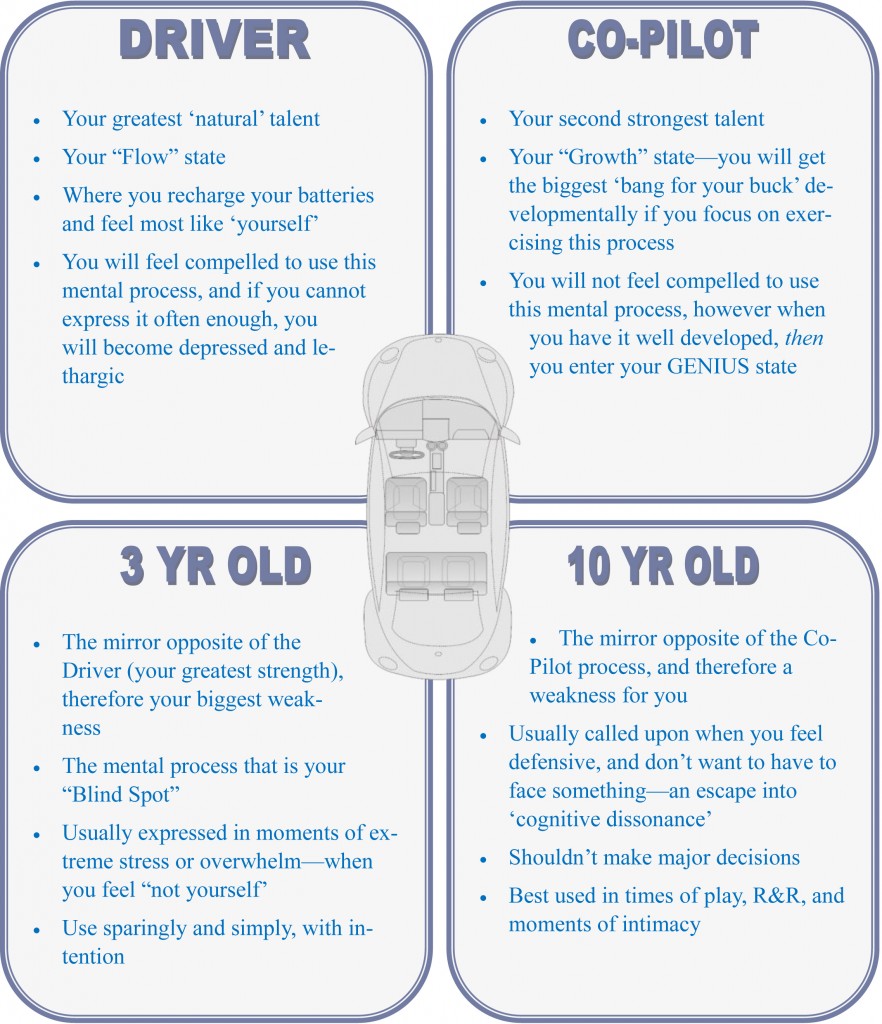Download Episode Here – right click link and select “Save Link As…”
In this episode Joel and Antonia talk about developing a healthy relationship with your tertiary cognitive function (what we call the 10-year-old in the Car Model).
In this podcast you’ll find:
10 year old cognitive function is the one we go to in place of the copilot. Our chief suggestion for growth is to focus on the copilot. We encourage people to stop giving preference to their 10 year old in place of the copilot.
This is not intended as a demonization of the 10 year old. Today we want to show you how accessing your 10 year old in a certain way can accelerate your personal growth.
Rule of Thumb:
- We start developing Driver in teens
- Copilot in 20s-30s
- Tertiary in 30-40s
- Inferior 50s +
It is possible to accelerate this process with focused personal growth.
If you spend enough time exercising your copilot you may be ready to start working on your 10 year old.
What is the loop we are always discouraging people from exercising? The loop is the tendency to stay in the same attitude with which you lead. If you are an introvert you get caught in a loop that favors the introverted world. If you are an extravert you get caught in a loop that favors the extraverted world.
How can we use our 10 year old to be a beneficial tool in our basket?
When we get caught in the loop we are usually doing it because our dominant process is practicing confirmation bias. The 10 year old will usually support the viewpoint of the Driver, and sometimes this is exactly what our driver is looking for.
When we have a good healthy relationship with our 10 year old we find it helps support us because it gives us extra tools that we wouldn’t necessarily have access to.
For example:
-
INTJ – Imagine an INTJ in a relationship where things aren’t going too well. 10 yr old may say, “This relationship is doomed,” because that is what the Driver is already thinking.
- Suggestion: Get into copilot Te* and make pro/con list and create metric around it. What is the dynamic? How are you contributing to this dynamic? 10 year old is telling you that this is completely unfixable, but your copilot may indicate there is a way to save the relationship if you act like an adult and stop asking guidance from a 10 year old.
- Alternatively, Let’s say you are going to your copilot and using the lens of your best and highest self already. How will the 10 year old show up in this case?
- It is still there but it is no longer just a mindless support system.
- For INTJs, the 10 year old is Fi which helps them see how they feel and how others feel. As a support to the copilot, Fi will make and INTJ more sympathetic. It’s about implementing systems that make everyone feel good. Implementing strategies that take everyone into consideration.
- ENTP – 10 year old Fe – This manifests as disconcerting connections. Social anxiety resulting in emotional meltdown. Copilot helps ENTPs get rational without the emotional variable. ENTPs bring clarity by using their copilot Ti. The 10 year old helps them to communicate truths in a way that is more palatable. Delivering a truth that needs to be delivered in a package that doesn’t trigger its listeners.
The 10 year old helps us flush out our messages and gets us in a space where we are more effective at what we are attempting to accomplish.
More Examples:
- ISTP – 10 year old Ni: Ti/Ni loop. ISTPs at their best in Se – copilot. 10 year old needs in the moment experience to be used well by ISTPs. An ISTP might speculate wrongly if he doesn’t start with Se and follow with Ni. Ni can support Se in anticipating what can happen in the moment. Great in law enforcement.
- ESFJ – 10 year old is Ne: in the Fe/Ne loop, ESFJs create patterns that aren’t accurate. Si would look at the precedent and past experience, then 10 year old could form a pattern based upon actual evidence rather than theoretical speculation. Ne becomes more accurate when used in conjunction with Si.
Homework:
- How have you gone to your 10 year old in a defensive way? How has it supported your copilot in a good way? When have things gone right and when have things gone terribly wrong? Post your comments below.
*Abbreviation legend:
- Te – Extraverted Thinking or Effectiveness
- Fi – Introverted Feeling or Authenticity
- Fe – Extraverted Feeling or Harmony
- Ti – Introverted Thinking or Accuracy
- Ni – Introverted iNtuition or Perspectives
- Ne – Extraverted iNtuition or Exploration
- Se – Extraverted Sensing or Sensation
- Si – Introverted Sensing or Memory
To subscribe to the podcast, please use the links below:
Subscribe with iTunes
Non iTunes Link
Download The Android App
Subscribe on Soundcloud
Subscribe with Stitcher
If you like the podcast and want to help us out in return, please leave an honest rating and review on iTunes by clicking here. It will help the show and its ranking in iTunes immensely! We would be eternally grateful!
Want to learn more?
Discover Your Personal Genius
We want to hear from you. Leave your comments below…




Share:
Podcast - Episode 0121 - Love At First Fight With Bruce Muzik
Podcast - Episode 0123 - Self Awareness vs Self Development
20 comments
Thanks for your comment, Dray! I posted the exercise at the bottom of the notes. Thanks for pointing that out. :)
Hi Cathy! Thanks for the comment. I’m the same way. As an INFJ I have the same copilot and 10 year as you do. It is a constant battle to stay in Harmony when Accuracy wants to take over.
Sorry. I mean ISFJ.
Really great podcast! Thanks so much for touching on this topic. I found it particularly helpful because my husband is an INTJ, and my mom is an ESFJ, so it is great to have more insight into their processes. As an INFP I do sometimes struggle with a temptation to shut myself off—particularly if I have been spending a lot of time around people and/or encountering situations that I find stressful. Thankfully my life circumstances have powerfully reinforced my exploration co-pilot for decades, and I have employed memory pretty well in “creating safe environments for people I love.” I think I need to understand a bit more about how to use memory to support exploration when I feel myself pulled toward the introversion loop, though. But, according to the rule of thumb you mention, I am also ready to start working on my “3 year old,” haha! Oh, hey, you know what would be super helpful? Could you post the podcast-specific exercise at the end of the podcast notes? Really appreciate what you do!!!
ISFP here. Memory (Si) driver and Harmony (Fe) copilot combine to make me (when healthy) concerned about others. In just the last few months, I have noticed that my Accuracy (Ti) 10 year old process has been maturing. In my final semester of college (I am a nontraditional student), about 50 of us had to present our Capstone projects. This was scheduled for 9 am to 2:30 pm, and no lunch was provided. So I arranged for finger foods to be catered, collected donations from my classmates to cover the cost, and kept an eye on it (during my presentation time, how fun!). Everything worked out very well, and I was given an award by my department partially because I stepped up to make sure that everyone was cared for.
I do, however, have to watch out for Accuracy, because if I feel defensive, I have a tendency to turn off the Harmony and just be really mean, cold, and harsh. All the facts, none of the concern about others’ feelings or situations.
Great podcast!